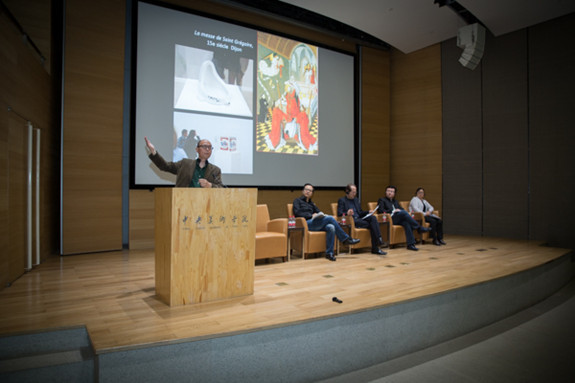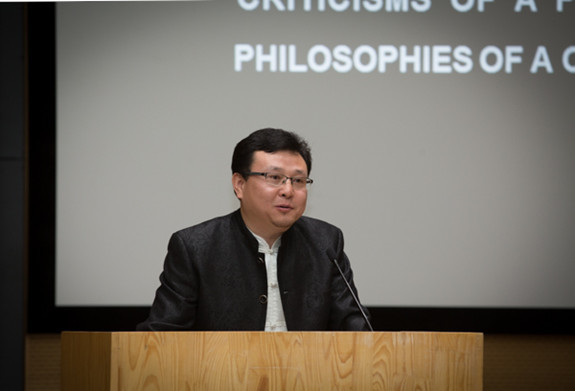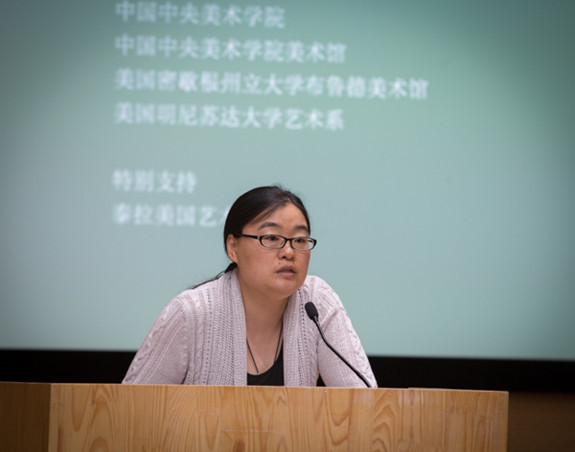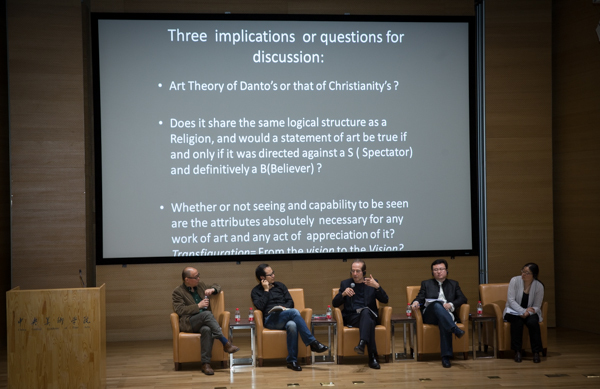

时间:2015年4月23日 9:00-12:00
地点:中央美术学院美术馆 学术报告厅
主办:中国中央美术学院、中国中央美术学院美术馆、美国密西根州立大学布鲁德美术馆、美国明尼苏达大学艺术系
2015年4月23日,“阿瑟·丹托国际学术研讨会”已经进入会程的第二天。继前一天围绕阿瑟·丹托的主要哲学思想以及“艺术终结论”热烈讨论之后,今天的两场主题似乎在更大程度上了唤起了中国艺术家与学者的期待:“丹托的艺术批评”与“丹托艺术哲学与批评对中国艺术的意义”。这使得本次在北京召开的关于丹托的国际研讨会具有了更诚恳的姿态和更现时的意义。
上午9时,研讨会准时开始,第二场“丹托的艺术批评”主题研讨由中央美术学院李军教授主持,与会发言人包括中央美术学院王春辰副教授、中国社会科学院哲学所刘悦笛副研究员、西南大学文学院张冰教授以及美国纽约哥伦比亚大学亚历山大·阿波罗(Alex Alberro)教授。
主题发言
艺术如何与哲学相关——王春辰

作为本场研讨会的组织者,也是丹托的艺术哲学得以被介绍到中国来的主要奠基人之一,王春辰老师在这一场发言中以“艺术如何与哲学相关”为视角来讨论“艺术批评”的主题。通过分享自己与丹托艺术哲学的际遇以及逐渐深入的接受过程,他指出,我们必然需要在对西方艺术的了解前提下才能真正体悟到丹托在提出“艺术史终结”等一系列问题背后的诉求与动力。当艺术已经不得不超越其自身而需借用哲学方式来思考的时候,丹托所做的实际上是一种“为艺术定义”的工作,从而为所有包括艺术家、批评家在内的人提供了一种哲学途径和出口。
王春辰老师指出,在丹托自1984年以来每隔一两年出版的关于艺术批评的文集中,体现了他做艺术批评的努力实践。他认为,丹托提出“终结论”、“后历史”等理论后,如何实践具体的艺术批评即“艺术如何与哲学相关”就成为一个实际问题,甚至更迫切的问题。后历史情境下的“一切皆可以成为艺术”不等于艺术的无差别,不等于艺术都处在同一个评价维度上。而对丹托的艺术批评,我们应该给以充分地、积极的评价和认识,这是发现丹托意义的进一步深化。
他同时在发言中引入了对“aboutness”概念的解释,并指出这种被译为“相关性”的概念实际上正内涵着一种包容的哲学立场,因此艺术走向哲学是在更大自由上为我们提供了契机和土壤。
最后,王春辰老师强调,当我们感觉到艺术就像是一片漂浮的云而无法抓获之时,哲学则为我们找到了这样一种途径去接近它。丹托于1983到2013年的所有著作和文章,都是对1964年提出的艺术界的不断深化。他的工作也提示我们,只有进入到艺术现场,才能够超越今天所有从理论表层生发的讨论与困惑。
哲学家的批评与批评家的哲学——刘悦笛

中国社会科学院的刘悦笛先生以丹托的双重身份为切入点,提供了“作为艺术批评家的丹托”与“作为哲学家的丹托”这样一个可供对照的角度。从而引发出他所思考的“丹托的工作”在两者之间体现出的张力、悖论与得失问题。
他首先提出了丹托从分析哲学转向分析美学的三个关键环节,即分析的基本方法的自觉运用、由行动理论到知觉理论的推演以及直接借鉴为艺术史叙事理论的历史叙事理论。他认为,丹托不仅从哲学走向了批评,且在批评中体现了明显的哲学诉求。然而这种哲学诉求反射到他的艺术批评之中,则表现为“批评的哲学化”,从而进一步形成了“哲学的反多元主义”与“批评的多元主义”之间的矛盾。对此,刘悦笛先生提出了在哲学与批评的张力之间所存在的得失疑问:
伴随着所谓“艺术史的终结”,是否会带来艺术批评的多元主义?丹托的批评是否偏离了批评的基本功能特别是忽视了“评价”作为批评的首要角色?到底是为了哲学的批评还是为了批评的哲学?针对这几个问题,刘悦笛先生也提供了较为深入的论述,并借此摆出丹托对后现代主义的拒绝态度以及刘悦笛先生认为其批评角色的不完整、丹托在批评与哲学之间的平衡处理等问题上的开放性结论。
最后,他还举出了其批评被哲学化的一个例证,即丹托对晚期中国绘画与“中国艺术终结论”的观点。他认为,丹托将西方绘画体系对中国近代绘画体系的强制挤压视为中国传统艺术的终结,是从批评直接走向了哲学的结果。
从对“文学危机”的命名看中国对丹托的接受——张冰

张冰教授是这场研讨会唯一一位非艺术也非哲学背景的学者,她对于终结论超出了艺术史的范畴而被文学史甚至更为广泛的领域所接受的状况描述,为我们提供了另一种关照角度,迫使我们去思考丹托的“艺术史的终结”在中国被视为一种具有普遍意义的哲学理论被接受的状况。
她在发言中涉入了一个值得反思的普遍现象,即国内各领域对丹托“终结论”观点的滥用以及这种滥用背后对丹托艺术哲学的错位理解。这就引入了丹托在中国是如何被接受的话题。
对于这个问题,张冰教授以“文学危机”在命名上对“终结”一词的借用为例做了论述。她指出,随着2001年《艺术的终结》一书被欧阳英先生译成中文,“终结”的概念就因其带有某种偏激的、危险耸听的特质而被迅速地传播并使用。它代替了所有对危机的其它命名,如尴尬、死亡、衰败等。文学史正是在这个层面上对丹托的理论进行了错位的接受。并且使得对文学危机的焦虑情绪意外地获得了某种程度上的缓解。显然,这种缓解是建立在对“终结”问题的“全球化”共鸣之上的。
在发言的最后,她指出,实际上我们很难从真正意义上获得对丹托的正确接受,因为这种文化以及时代上的隔阂是无法躲避的,我们没有接受60年代美国艺术所发生转变时的那种紧张感,从而也不可能接受到由那种紧张感所生发出来的对“终结”的在场般的理解。
对于以上几位学者的观点,主持人李军教授分别做了简短的总结和回应。在短暂的茶歇之后,研讨会进入到更为精彩的对谈时间。
对谈环节

关键词:宗教 视觉作用
李军教授首先在现场播放了几张艺术作品图,其中包括杜尚的小便池,也包括梵蒂冈教堂(描绘圣餐仪式)的宗教壁画。通过这几幅作品图,他尝试将宗教引入到丹托对艺术哲学的思考之中,即提出这种思考与基督教里对圣餐(面包和酒变成了耶稣的血和肉)的思考是一个逻辑。他同时提出艺术不可能完全取消观看在其中的作用,丹托完全取消了眼睛的贡献必然使得他的理论存有潜在的危机。
亚历山大(Alex Alberro)教授从画廊对艺术品的贡献的角度来回应视觉在其中并不起必然的作用。画廊的组织使得一件不是艺术的东西成为艺术品,而不是视觉上的“震撼”使得它成为艺术品。他认为,另一个以看不见的“风”为作品的例子也可以说明这个问题。
玛丽·怀斯曼(Mary Wiseman)女士则对李军教授所引入的视觉的作用表示部分认同。她认为,魔法式的转变是没错的,但“看到”或者在一定程度上“感觉到”对于艺术来说也是必要的条件,不能做一个完全空的观念艺术作品,尽管感官上的体验不足以实现魔法式的转变。
关键词:艺术家 批评家
台下观众提出了另外一个问题:如何看待在艺术走向哲学之后,艺术家保持沉默而批评家在代替其发言的问题?丹托似乎使得这种奇怪的机制变得合法。
亚历山大教授在这个问题的回应上借用了一个带有隐喻的相关性的例子,即鸟类学家对于鸟的研究。有时艺术家不需要批评家就像鸟不需要鸟类学家一样,但是鸟类学家研究鸟有他自己的用处,批评家也是在这个意义上需要对艺术家的作品进行研究,以更好了解艺术是如何发生作用的。因此艺术批评对于理解艺术哲学是有意义的。
关键词:全球化
张冰教授在发言中曾提及“全球化”的概念。亚历山大教授则对此提出了更深入的思考。他指出,“国际化”有“国家”的含义在里面,而“全球化”没有,似乎国家的终结成就了全球。国家是和某种宗教或者文化、意识相联系的,我们只能假设这些东西依然能够在翻译的过程中得以保存。正如我们反对“世界文学”一样,我们呼吁大家重返当地各国的各种传统,“全球化”的引入实际上导致了国家或者是国内特征的终结。
刘悦笛先生接着指出,不仅如此,国家的终结和艺术的终结还牵涉到更为多层次的复杂的问题。我们还应该这样考虑:艺术终结是全球性的吗?是所有的国家一起同时终结还是各个国家逐个分别终结?
关键词:策展 理论批评
亚历山大教授在前面讨论中提到过两种批评,一个是直面作品的批评,一个理论的批评。刘悦笛先生指出,阿瑟·丹托是后者。他认为,当我们从理论出发去做展览的时候,就会出现很多问题。中国很多展览都是这样,常常使用一个大词放到那里,并试图让艺术家按照策展人的观念去做。对此他提出质疑:这样的展览是一个成功展览吗?这样的理论批评不是一个危险吗?
王春辰老师认为,这是展览在策划当中必然要面对的问题,且我们需要有一个题目去说明。因为我们需要借助于艺术来讨论问题,而这个题目是关于这个问题的。更重要的是,这种方式得到了艺术家、哲学家、历史学家、批评家的共同认同,他们愿意参与到以艺术为名的场域里来讨论一个展览所指向的问题。我们不去定义“它”是不是艺术,我们只关注在这个场域中,“它”可能有意义。
关键词:艺术家 自我阐述
观众提出这样一个问题:艺术家在艺术哲学的时代背景下,被一种强势的力所带领,不得不去为自己的作品进行阐述。从一开始的不擅长与不自信到后来被训练地游刃有余,这是否陷入了一种机制的阴谋中?
亚历山大教授对此作出回答。他不认为这是一种阴谋,他认为这是一种教育,正如我们了解建筑的相关知识之后再去看一座建筑物所带来的不同深度上对它的认识。所以,这种自我阐述的训练是一种带领艺术家逐步深入其艺术内在的训练,是了解世界、了解人类、了解自己的一种途径。
结语:
本场研讨会最终在对于“观念艺术与生活”的讨论中告一段落。王春辰老师指出:“我是画家,不是艺术家”与“我是艺术家,不是画家”之间,实际上有一个立场上的区别。这个立场背后,仍是对观念艺术与绘画艺术的区分。这种区分有其漫长的历史根源,我们不能急于迫使转变。但正如阿瑟·丹托所提倡的,后历史时期多元主义下的艺术,要求我们有一种包容的姿态。而这个姿态,对于今天的艺术批评来说,是必需的。

尹冉旭/文
何一沙/编
全 晶/图
CAFA Art Museum Publication Authorization Agreement
I fully agree to CAFA Art Museum (CAFAM) submitting to CAFA for publication the images, pictures, texts, writings, and event products (such as works created during participation in workshops) related to me from my participation in public events (including museum member events) organized by the CAFA Art Museum Public Education Department. CAFA can publish these materials by electronic, web, or other digital means, and I hereby agree to be included in the China Knowledge Resource Bank, the CAFA Database, the CAFA Art Museum Database, and related data, documentation, and filing institutions and platforms. Regarding their use in CAFA and dissemination on the internet, I agree to make use of these rights according to the stated Rules.
CAFA Art Museum Event Safety Disclaimer
Article I
This event was organized on the principles of fairness, impartiality, and voluntary participation and withdrawal. Participants undertake all risk and liability for themselves. All events have risks, and participants must be aware of the risks related to their chosen event.
Article II
Event participants must abide by the laws and regulations of the People’s Republic of China, as well as moral and ethical norms. All participants must demonstrate good character, respect for others, friendship, and a willingness to help others.
Article III
Event participants should be adults (people 18 years or older with full civil legal capacity). Underage persons must be accompanied by an adult.
Article IV
Event participants undertake all liability for their personal safety during the event, and event participants are encouraged to purchase personal safety insurance. Should an accident occur during an event, persons not involved in the accident and the museum do not undertake any liability for the accident, but both have the obligation to provide assistance. Event participants should actively organize and implement rescue efforts, but do not undertake any legal or economic liability for the accident itself. The museum does not undertake civil or joint liability for the personal safety of event participants.
Article V
During the event, event participants should respect the order of the museum event and ensure the safety of the museum site, the artworks in displays, exhibitions, and collections, and the derived products. If an event causes any degree of loss or damage to the museum site, space, artworks, or derived products due to an individual, persons not involved in the accident and the museum do not undertake any liability for losses. The event participant must negotiate and provide compensation according to the relevant legal statutes and museum rules. The museum may sue for legal and financial liability.
Article VI
Event participants will participate in the event under the guidance of museum staff and event leaders or instructors and must correctly use the painting tools, materials, equipment, and/or facilities provided for the event. If a participant causes injury or harm to him/herself or others while using the painting tools, materials, equipment, and/or facilities, or causes the damage or destruction of the tools, materials, equipment, and/or facilities, the event participant must undertake all related liability and provide compensation for the financial losses. Persons not involved in the accident and the museum do not undertake any liability for personal accidents.
CAFA Art Museum Portraiture Rights Licensing Agreement
According to The Advertising Law of the People’s Republic of China, The General Principles of the Civil Law of the People’s Republic of China, and The Provisional Opinions of the Supreme People’s Court on Some Issues Related to the Full Implementation of the General Principles of the Civil Law of the People’s Republic of China, and upon friendly negotiation, Party A and Party B have arrived at the following agreement regarding the use of works bearing Party A’s image in order to clarify the rights and obligations of the portrait licenser (Party A) and the user (Party B):
I. General Provisions
(1) Party A is the portraiture rights holder in this agreement. Party A voluntarily licenses its portraiture rights to Party B for the purposes stipulated in this agreement and permitted by law.
(2) Party B (CAFA Art Museum) is a specialized, international modern art museum. CAFA Art Museum keeps pace with the times, and works to create an open, free, and academic space and atmosphere for positive interaction with groups, corporations, institutions, artists, and visitors. With CAFA’s academic research as a foundation, the museum plans multi-disciplinary exhibitions, conferences, and public education events with participants from around the world, providing a platform for exchange, learning, and exhibition for CAFA’s students and instructors, artists from around the world, and the general public. As a public institution, the primary purposes of CAFA Art Museum’s public education events are academic and beneficial to society.
(3) Party B will photograph all CAFA Public Education Department events for Party A.
II. Content, Forms of Use, and Geographical Scope of Use
(1) Content. The content of images taken by Party B bearing Party A’s likeness include: ① CAFA Art Museum ② CAFA campus ③ All events planned or executed by the CAFAM Public Education Department.
(2) Forms of Use. For use in CAFA’s publications, products with CDs, and promotional materials.
(3) Geographical Scope of Use
The applicable geographic scope is global.
The media in which the portraiture may be used encompasses any media that does not infringe upon Party A’s portraiture rights (e.g., magazines and the internet).
III. Term of Portraiture Rights Use
Use in perpetuity.
IV. Licensing Fees
The fees for images bearing Party A’s likeness will be undertaken by Party B.
After completion, Party B does not need to pay any fees to Party A for images bearing Party A’s likeness.
Additional Terms
(1) All matters not discussed in this agreement shall be resolved through friendly negotiation between both parties. Both parties may then sign a supplementary agreement, provided it does not violate any laws or regulations.
(2) This agreement comes into effect on the date that it is signed (sealed) and the relevant boxes are selected by Party A and Party B.
(3) This agreement exists in paper and electronic forms. The paper form is made in duplicate, with Party A and Party B each retaining one copy with the same legal efficacy.
Event participants implicitly accept and undertake all the obligations stated in this agreement. Those who do not consent will be seen as abandoning the right to participate in this event. Before participating in this event, please speak to your family members to obtain their consent and inform them of this disclaimer. After participants sign/check the required box, participants and their families will be seen as having read and agreed to these terms.
I have carefully read and agree to the above provisions.
CAFA Art Museum Publication Authorization Agreement
I fully agree to CAFA Art Museum (CAFAM) submitting to CAFA for publication the images, pictures, texts, writings, and event products (such as works created during participation in workshops) related to me from my participation in public events (including museum member events) organized by the CAFA Art Museum Public Education Department. CAFA can publish these materials by electronic, web, or other digital means, and I hereby agree to be included in the China Knowledge Resource Bank, the CAFA Database, the CAFA Art Museum Database, and related data, documentation, and filing institutions and platforms. Regarding their use in CAFA and dissemination on the internet, I agree to make use of these rights according to the stated Rules.
CAFA Art Museum Event Safety Disclaimer
Article I
This event was organized on the principles of fairness, impartiality, and voluntary participation and withdrawal. Participants undertake all risk and liability for themselves. All events have risks, and participants must be aware of the risks related to their chosen event.
Article II
Event participants must abide by the laws and regulations of the People’s Republic of China, as well as moral and ethical norms. All participants must demonstrate good character, respect for others, friendship, and a willingness to help others.
Article III
Event participants should be adults (people 18 years or older with full civil legal capacity). Underage persons must be accompanied by an adult.
Article IV
Event participants undertake all liability for their personal safety during the event, and event participants are encouraged to purchase personal safety insurance. Should an accident occur during an event, persons not involved in the accident and the museum do not undertake any liability for the accident, but both have the obligation to provide assistance. Event participants should actively organize and implement rescue efforts, but do not undertake any legal or economic liability for the accident itself. The museum does not undertake civil or joint liability for the personal safety of event participants.
Article V
During the event, event participants should respect the order of the museum event and ensure the safety of the museum site, the artworks in displays, exhibitions, and collections, and the derived products. If an event causes any degree of loss or damage to the museum site, space, artworks, or derived products due to an individual, persons not involved in the accident and the museum do not undertake any liability for losses. The event participant must negotiate and provide compensation according to the relevant legal statutes and museum rules. The museum may sue for legal and financial liability.
Article VI
Event participants will participate in the event under the guidance of museum staff and event leaders or instructors and must correctly use the painting tools, materials, equipment, and/or facilities provided for the event. If a participant causes injury or harm to him/herself or others while using the painting tools, materials, equipment, and/or facilities, or causes the damage or destruction of the tools, materials, equipment, and/or facilities, the event participant must undertake all related liability and provide compensation for the financial losses. Persons not involved in the accident and the museum do not undertake any liability for personal accidents.
CAFA Art Museum Portraiture Rights Licensing Agreement
According to The Advertising Law of the People’s Republic of China, The General Principles of the Civil Law of the People’s Republic of China, and The Provisional Opinions of the Supreme People’s Court on Some Issues Related to the Full Implementation of the General Principles of the Civil Law of the People’s Republic of China, and upon friendly negotiation, Party A and Party B have arrived at the following agreement regarding the use of works bearing Party A’s image in order to clarify the rights and obligations of the portrait licenser (Party A) and the user (Party B):
I. General Provisions
(1) Party A is the portraiture rights holder in this agreement. Party A voluntarily licenses its portraiture rights to Party B for the purposes stipulated in this agreement and permitted by law.
(2) Party B (CAFA Art Museum) is a specialized, international modern art museum. CAFA Art Museum keeps pace with the times, and works to create an open, free, and academic space and atmosphere for positive interaction with groups, corporations, institutions, artists, and visitors. With CAFA’s academic research as a foundation, the museum plans multi-disciplinary exhibitions, conferences, and public education events with participants from around the world, providing a platform for exchange, learning, and exhibition for CAFA’s students and instructors, artists from around the world, and the general public. As a public institution, the primary purposes of CAFA Art Museum’s public education events are academic and beneficial to society.
(3) Party B will photograph all CAFA Public Education Department events for Party A.
II. Content, Forms of Use, and Geographical Scope of Use
(1) Content. The content of images taken by Party B bearing Party A’s likeness include: ① CAFA Art Museum ② CAFA campus ③ All events planned or executed by the CAFAM Public Education Department.
(2) Forms of Use. For use in CAFA’s publications, products with CDs, and promotional materials.
(3) Geographical Scope of Use
The applicable geographic scope is global.
The media in which the portraiture may be used encompasses any media that does not infringe upon Party A’s portraiture rights (e.g., magazines and the internet).
III. Term of Portraiture Rights Use
Use in perpetuity.
IV. Licensing Fees
The fees for images bearing Party A’s likeness will be undertaken by Party B.
After completion, Party B does not need to pay any fees to Party A for images bearing Party A’s likeness.
Additional Terms
(1) All matters not discussed in this agreement shall be resolved through friendly negotiation between both parties. Both parties may then sign a supplementary agreement, provided it does not violate any laws or regulations.
(2) This agreement comes into effect on the date that it is signed (sealed) and the relevant boxes are selected by Party A and Party B.
(3) This agreement exists in paper and electronic forms. The paper form is made in duplicate, with Party A and Party B each retaining one copy with the same legal efficacy.
Event participants implicitly accept and undertake all the obligations stated in this agreement. Those who do not consent will be seen as abandoning the right to participate in this event. Before participating in this event, please speak to your family members to obtain their consent and inform them of this disclaimer. After participants sign/check the required box, participants and their families will be seen as having read and agreed to these terms.
I have carefully read and agree to the above provisions.
CAFA Art Museum Publication Authorization Agreement
I fully agree to CAFA Art Museum (CAFAM) submitting to CAFA for publication the images, pictures, texts, writings, and event products (such as works created during participation in workshops) related to me from my participation in public events (including museum member events) organized by the CAFA Art Museum Public Education Department. CAFA can publish these materials by electronic, web, or other digital means, and I hereby agree to be included in the China Knowledge Resource Bank, the CAFA Database, the CAFA Art Museum Database, and related data, documentation, and filing institutions and platforms. Regarding their use in CAFA and dissemination on the internet, I agree to make use of these rights according to the stated Rules.
CAFA Art Museum Event Safety Disclaimer
Article I
This event was organized on the principles of fairness, impartiality, and voluntary participation and withdrawal. Participants undertake all risk and liability for themselves. All events have risks, and participants must be aware of the risks related to their chosen event.
Article II
Event participants must abide by the laws and regulations of the People’s Republic of China, as well as moral and ethical norms. All participants must demonstrate good character, respect for others, friendship, and a willingness to help others.
Article III
Event participants should be adults (people 18 years or older with full civil legal capacity). Underage persons must be accompanied by an adult.
Article IV
Event participants undertake all liability for their personal safety during the event, and event participants are encouraged to purchase personal safety insurance. Should an accident occur during an event, persons not involved in the accident and the museum do not undertake any liability for the accident, but both have the obligation to provide assistance. Event participants should actively organize and implement rescue efforts, but do not undertake any legal or economic liability for the accident itself. The museum does not undertake civil or joint liability for the personal safety of event participants.
Article V
During the event, event participants should respect the order of the museum event and ensure the safety of the museum site, the artworks in displays, exhibitions, and collections, and the derived products. If an event causes any degree of loss or damage to the museum site, space, artworks, or derived products due to an individual, persons not involved in the accident and the museum do not undertake any liability for losses. The event participant must negotiate and provide compensation according to the relevant legal statutes and museum rules. The museum may sue for legal and financial liability.
Article VI
Event participants will participate in the event under the guidance of museum staff and event leaders or instructors and must correctly use the painting tools, materials, equipment, and/or facilities provided for the event. If a participant causes injury or harm to him/herself or others while using the painting tools, materials, equipment, and/or facilities, or causes the damage or destruction of the tools, materials, equipment, and/or facilities, the event participant must undertake all related liability and provide compensation for the financial losses. Persons not involved in the accident and the museum do not undertake any liability for personal accidents.
CAFA Art Museum Portraiture Rights Licensing Agreement
According to The Advertising Law of the People’s Republic of China, The General Principles of the Civil Law of the People’s Republic of China, and The Provisional Opinions of the Supreme People’s Court on Some Issues Related to the Full Implementation of the General Principles of the Civil Law of the People’s Republic of China, and upon friendly negotiation, Party A and Party B have arrived at the following agreement regarding the use of works bearing Party A’s image in order to clarify the rights and obligations of the portrait licenser (Party A) and the user (Party B):
I. General Provisions
(1) Party A is the portraiture rights holder in this agreement. Party A voluntarily licenses its portraiture rights to Party B for the purposes stipulated in this agreement and permitted by law.
(2) Party B (CAFA Art Museum) is a specialized, international modern art museum. CAFA Art Museum keeps pace with the times, and works to create an open, free, and academic space and atmosphere for positive interaction with groups, corporations, institutions, artists, and visitors. With CAFA’s academic research as a foundation, the museum plans multi-disciplinary exhibitions, conferences, and public education events with participants from around the world, providing a platform for exchange, learning, and exhibition for CAFA’s students and instructors, artists from around the world, and the general public. As a public institution, the primary purposes of CAFA Art Museum’s public education events are academic and beneficial to society.
(3) Party B will photograph all CAFA Public Education Department events for Party A.
II. Content, Forms of Use, and Geographical Scope of Use
(1) Content. The content of images taken by Party B bearing Party A’s likeness include: ① CAFA Art Museum ② CAFA campus ③ All events planned or executed by the CAFAM Public Education Department.
(2) Forms of Use. For use in CAFA’s publications, products with CDs, and promotional materials.
(3) Geographical Scope of Use
The applicable geographic scope is global.
The media in which the portraiture may be used encompasses any media that does not infringe upon Party A’s portraiture rights (e.g., magazines and the internet).
III. Term of Portraiture Rights Use
Use in perpetuity.
IV. Licensing Fees
The fees for images bearing Party A’s likeness will be undertaken by Party B.
After completion, Party B does not need to pay any fees to Party A for images bearing Party A’s likeness.
Additional Terms
(1) All matters not discussed in this agreement shall be resolved through friendly negotiation between both parties. Both parties may then sign a supplementary agreement, provided it does not violate any laws or regulations.
(2) This agreement comes into effect on the date that it is signed (sealed) and the relevant boxes are selected by Party A and Party B.
(3) This agreement exists in paper and electronic forms. The paper form is made in duplicate, with Party A and Party B each retaining one copy with the same legal efficacy.
Event participants implicitly accept and undertake all the obligations stated in this agreement. Those who do not consent will be seen as abandoning the right to participate in this event. Before participating in this event, please speak to your family members to obtain their consent and inform them of this disclaimer. After participants sign/check the required box, participants and their families will be seen as having read and agreed to these terms.
I have carefully read and agree to the above provisions.

